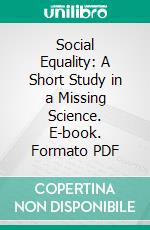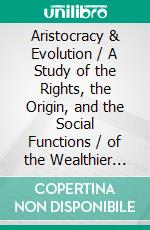W H Mallock eBooks
eBooks di W H Mallock di Formato Pdf
Social Equality: A Short Study in a Missing Science. E-book. Formato PDF W. H. Mallock - Forgotten Books, 2017 -
The country rector's phaeton. The central group in the drama is the large barouche with its occupant. All the passers-by turn to it for at least a moment, and acknowledge either by their looks or salutations the importance of the principle that is embodied in it. The solicitor squints at it the farmer touches his hat to it; the rector waves his hand to it. Nor is this all: for between these minor characters there are looks or salutations also; and they are each charged with a meaning either of respect or of condescension. The whole forms. A scene with which we are all familiar every object and every incident can be imagined without an efibrt and few scenes, to many people, could seem more prosaic and common-place.
Aristocracy & Evolution / A Study of the Rights, the Origin, and the Social Functions / of the Wealthier Classes. E-book. Formato PDF W. H. Mallock - Ionlineshopping.Com, 2019 -
The word aristocracy as used in the title of this volume has no exclusive, and indeed no special reference to a class distinguished by hereditary political privileges, by titles, or by heraldic pedigree. It here means the exceptionally gifted and efficient minority, no matter what the position in which its members may have been born, or what the sphere of social progress in which their exceptional efficiency shows itself. I have chosen the word aristocracy in preference to the word oligarchy because it means not only the rule of the few, but of the best or the most efficient of the few. Of the various questions involved in the general argument of the work, many would, if they were to be examined exhaustively, demand entire treatises to themselves rather than chapters. This is specially true of such questions as the nature of men’s congenital inequalities, the effects of different classes of motive in producing different classes of action, and the effects of equal education on unequal talents and temperaments. But the practical bearings of an argument are more readily grasped when its various parts are set forth with comparative brevity, than they are when the attention claimed for each is minute enough to do it justice as a separate subject of inquiry; and it has appeared to me that in the present condition of opinion, prevalent social fallacies may be more easily combated by putting the case against them in a form which will render it intelligible to everybody, and by leaving many points to be elaborated, if necessary, elsewhere. I may also add that the conclusions here arrived at, with whatever completeness they might have been explained, elaborated, and defended, would not, in my opinion, do more than partially answer the questions to which they refer. This volume aims only at establishing what are the social rights and social functions, in progressive communities, of the few. The entire question of their duties and proper liabilities, whether imposed on them by themselves or by the State, has been left untouched. This side of the question I hope to deal with hereafter. It is enough to observe here that it is impossible to define the duties of the few, of the rich, of the powerful, of the highly gifted, and to secure that these duties shall be performed by them, unless we first understand the extent of the functions which they inevitably perform, and admit frankly the indefeasible character of their rights.

